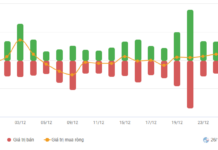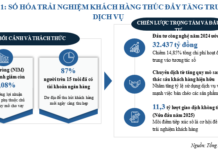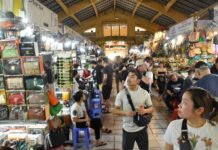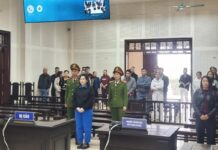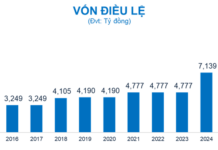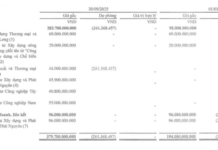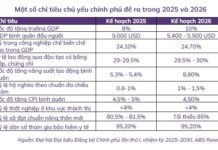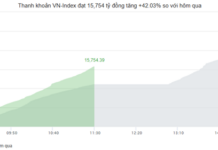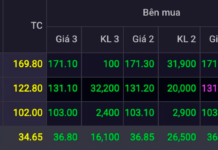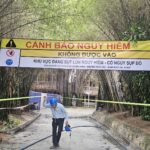On July 30, 2024, the Ministry of Agriculture and Rural Development issued Document No. 5436/BNN-TY, requesting the Chairman of the Hanoi People’s Committee to rectify poultry slaughtering activities and slaughter management at Hai Boi Market, Dong Anh District.
VIOLATIONS OF SLAUGHTER REGULATIONS
Hai Boi wholesale poultry market in Dong Anh District is one of the major suppliers of poultry and livestock to Hanoi, with an estimated volume of tens of thousands per day. However, this market in the northern area of the capital city has exposed several issues, including non-compliance with animal quarantine regulations, illegal fee collection, and a lack of proper invoices and documentation.
According to media reports, hundreds of large and small cars carrying poultry enter and exit the Hai Boi wholesale market daily without undergoing animal quarantine procedures. Over time, the control of poultry origin before entering the market and disinfection processes have been neglected by veterinary officials, leading to a loss of control over diseases and facilitating their spread.
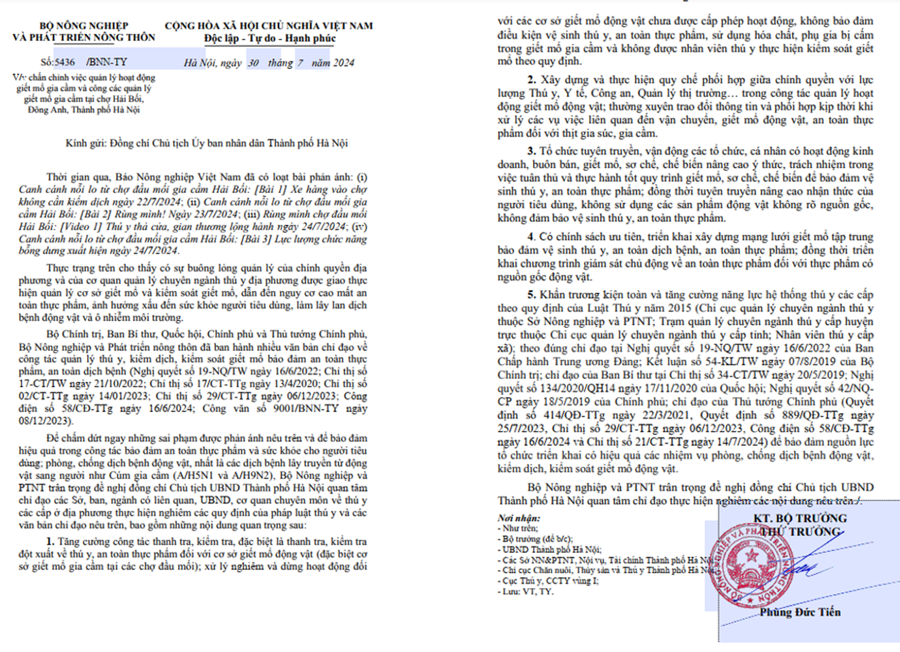
According to Circular No. 09/2016/TT-BNNPTNT, before slaughtering livestock and poultry, slaughterhouses must comply with regulations such as checking records and documentation on the origin of animals, obtaining veterinary health certificates for transportation, ensuring hygiene for those involved in slaughtering, and conducting clinical examinations of animals. These tasks must be performed by assigned veterinary officials for each vehicle entering and exiting the market.
However, during the time our journalists worked at the Hai Boi wholesale poultry market in June and the first half of July 2024, no presence of veterinary officials for quarantine or guidance on food safety practices was observed. As a result, tens of thousands of poultry are brought to the Hai Boi market daily without being inspected or quarantined by competent authorities.
At several poultry slaughter points in this market, some slaughterhouses use pine resin, a food additive that has been banned by the Ministry of Health, to clean chicken and duck feathers. Meanwhile, in a document sent to the Departments of Agriculture and Rural Development of the provinces to strengthen the control of poultry slaughterhouses, the Department of Quality Control, Processing and Market Development (MARD) has strictly prohibited the use of pine resin in the production, trading, and processing of food.
In case of violations, penalties will be imposed according to Decree No. 178/2013/ND-CP dated November 14, 2013, of the Government on sanctions for administrative violations in food safety and criminal liability under Articles 190, 191, and 317 of the 2015 Penal Code. Despite these regulations, according to our journalists’ observations at the poultry slaughterhouses in Hai Boi Market, thousands of poultry are still slaughtered using this method daily.
In Document No. 5436/BNN-TY, the Ministry of Agriculture and Rural Development stated: “The above situation indicates a lack of management by the local government and the specialized veterinary management agency, leading to a high risk of food safety issues, negative impacts on consumer health, and the spread of animal diseases and environmental pollution.”
ENHANCED INSPECTION AND VIOLATION HANDLING
To protect consumers’ health and ensure effective disease prevention, the Politburo, the Secretariat, the National Assembly, the Government, and the Prime Minister, along with the Ministry of Agriculture and Rural Development, have issued numerous directives on veterinary management, quarantine, and slaughter control to ensure food safety and disease prevention.
Mr. Phung Duc Tien, Deputy Minister of Agriculture and Rural Development, stated that to put an end to the above-mentioned violations and improve the effectiveness of ensuring food safety and consumer health, as well as preventing animal diseases, especially those transmissible from animals to humans, such as avian influenza (A/H5N1 and A/H9N2), the Ministry of Agriculture and Rural Development has requested the Chairman of the Hanoi People’s Committee to direct relevant departments, branches, and district-level People’s Committees to strictly comply with the regulations and directives of the Ministry of Agriculture and Rural Development.
At the same time, the city’s leaders were requested to strengthen inspection and supervision, especially surprise inspections, of veterinary, food safety, and animal slaughter facilities, particularly poultry slaughterhouses at wholesale markets.
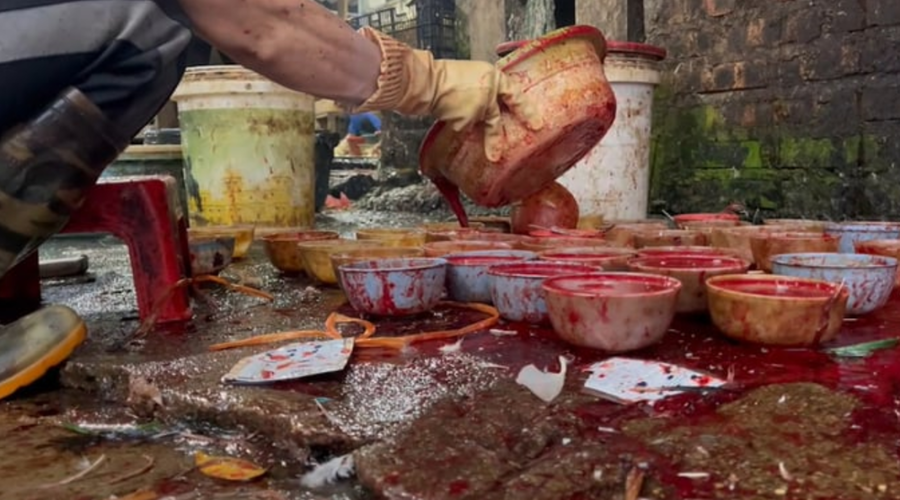
Accordingly, strict handling and cessation of operations should be imposed on animal slaughterhouses operating without permits, failing to meet veterinary hygiene and food safety standards, using banned chemicals and additives in poultry slaughter, and not having veterinary staff perform slaughter control as required.
Establish and implement a coordination mechanism between the authorities and veterinary, medical, police, and market management forces in managing animal slaughter activities, regularly exchanging information, and coordinating timely responses to incidents related to animal transportation, slaughter, and food safety of meat products.
Conduct propaganda and mobilization campaigns to raise awareness and responsibility among organizations and individuals involved in trading, slaughtering, processing, and producing poultry and livestock, encouraging them to comply with and practice good slaughtering, processing, and production procedures to ensure veterinary hygiene and food safety. Simultaneously, promote consumer awareness of not using animal products of unknown origin or those that do not meet veterinary hygiene and food safety standards.
Implement preferential policies and prioritize the development of centralized slaughterhouses that meet veterinary hygiene, disease safety, and food safety standards. Implement a proactive food safety monitoring program for food products of animal origin.
Expedite the completion and enhancement of the capacity of the veterinary system at all levels, in accordance with the 2015 Veterinary Law, to ensure the effective deployment of tasks related to the prevention and control of animal diseases, quarantine, and slaughter control.



